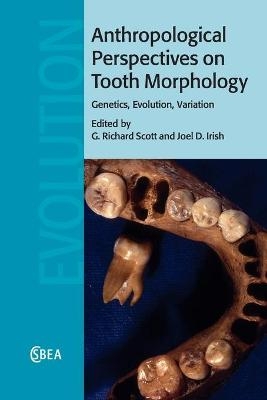
Anthropological Perspectives on Tooth Morphology
Cambridge University Press (Verlag)
978-1-108-82652-5 (ISBN)
Researchers have long had an interest in dental morphology as a genetic proxy to reconstruct population history. Much interest was fostered by the use of standard plaques and associated descriptions that comprise the Arizona State University Dental Anthropology System, developed by Christy G. Turner, II and students. This system has served as the foundation for hundreds of anthropological studies for over 30 years. In recognition of that success, this volume brings together some of the world's leading dental morphologists to expand upon the concepts and methods presented in the popular The Anthropology of Modern Human Teeth (Cambridge, 1997), leading the reader from method to applied research. After a preparatory section on the current knowledge of heritability and gene expression, a series of case studies demonstrate the utility of dental morphological study in both fossil and more recent populations (and individuals), from local to global scales.
G. Richard Scott is Emeritus Professor of Anthropology, University of Alaska, Fairbanks, and is currently Associate Professor and Chair of Anthropology at the University of Nevada, Reno. He co-authored The Anthropology of Modern Human Teeth with Christy G. Turner, II (Cambridge, 1997). Joel D. Irish is a Professor and Chair of the Anthropology Department, University of Alaska, Fairbanks. He has co-edited three volumes, was Associate Editor of the American Journal of Physical Anthropology and has over 60 biological anthropology publications, with an emphasis on dental morphology.
List of contributors; 1. Introduction G. Richard Scott and Joel D. Irish; 2. Bite marks in tule quids: the life and times of a dental anthropologist Christy G. Turner, II; 3. Twin and family studies of human dental crown morphology: genetic, epigenetic and environmental determinants of the modern human dentition Toby Hughes and Grant Townsend; 4. Teeth, morphogenesis, and levels of variation in the human Carabelli trait Debbie Guatelli-Steinberg, John P. Hunter, Ryan M. Durner, Stephanie Moormann, Theresia C. Weston and Tracy K. Betsinger; 5. The expression of human sex chromosome genes in oral and craniofacial growth Lassi Alvesalo; 6. Significant among-population associations found between dental characters and environmental factors Yuji Mizoguchi; 7. Using geometric morphometrics to study the mechanisms that pattern primate dental variation Oliver T. Rizk, Theresa M. Grieco, Michael W. Holmes and Leslea J. Hlusko; 8. Evolution of hominin postcanine macromorphology: a comparative meta-analysis Kes Schroer and Bernard Wood; 9. Dental morphology of European Middle Pleistocene populations María Martinón-Torres, José María Bermúdez de Castro, Laura Martín-Francés, Ana Gracia-Téllez, Ignacio Martínez and Juan Luis Arsuaga; 10. What does it mean to be dentally 'modern'? Shara E. Bailey and Jean-Jacques Hublin; 11. From outer to inner structural morphology in dental anthropology: integration of the third dimension in the visualization and quantitative analysis of fossil remains Roberto Macchiarelli, Priscilla Bayle, Luca Bondioli, Arnaud Mazurier and Clément Zanolli; 12. Afridonty: the 'Sub-Saharan African Dental Complex' revisited Joel D. Irish; 13. Basque dental morphology and the 'Eurodont' dental pattern G. Richard Scott, Alberto Anta, Conchita de la Rúa and Roman Schomberg; 14. A first look at the dental morphometrics of early Palauans Greg C. Nelson and Scott M. Fitzpatrick; 15. Grades, gradients, and geography: a dental morphometric approach to the population history of South Asia Brian E. Hemphill; 16. Do all Asians look alike? A dental nonmetric analysis of population diversity at the dawn of the Chinese empire (770 BC–AD 420) Christine Lee and Linhu Zhang; 17. Sinodonty and beyond: hemispheric, regional, and intracemetery approaches to studying dental morphological variation in the New World Christopher M. Stojanowski, Kent M. Johnson and William N. Duncan; 18. Crown morphology of Malay deciduous teeth: trait frequencies and biological affinities John R. Lukacs and Sri Kuswandari; 19. Geographic structure of dental variation in the major human populations of the world Tsunehiko Hanihara; 20. New approaches to the use of dental morphology in forensic contexts Heather J. H. Edgar and Stephen D. Ousley; 21. Wears the problem? Examining the effect of dental wear on studies of crown morphology Scott E. Burnett, Joel D. Irish and Michael R. Fong; Index.
| Erscheinungsdatum | 24.08.2020 |
|---|---|
| Reihe/Serie | Cambridge Studies in Biological and Evolutionary Anthropology |
| Zusatzinfo | Worked examples or Exercises; 47 Tables, black and white; 8 Plates, color; 39 Halftones, unspecified; 39 Halftones, black and white; 68 Line drawings, black and white |
| Verlagsort | Cambridge |
| Sprache | englisch |
| Maße | 230 x 150 mm |
| Gewicht | 840 g |
| Themenwelt | Naturwissenschaften ► Biologie ► Humanbiologie |
| ISBN-10 | 1-108-82652-0 / 1108826520 |
| ISBN-13 | 978-1-108-82652-5 / 9781108826525 |
| Zustand | Neuware |
| Informationen gemäß Produktsicherheitsverordnung (GPSR) | |
| Haben Sie eine Frage zum Produkt? |
aus dem Bereich


